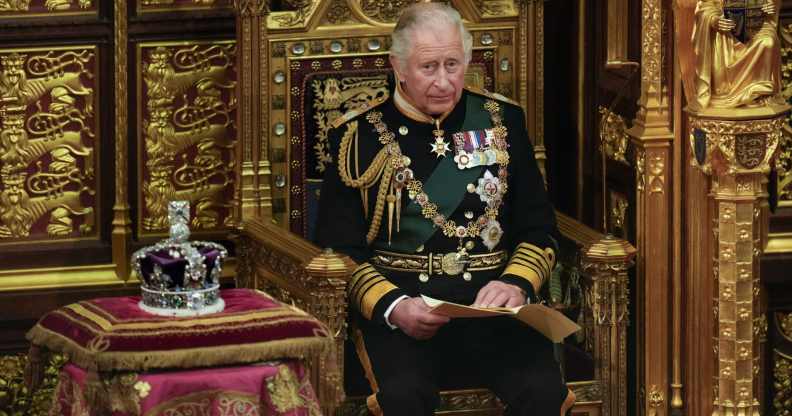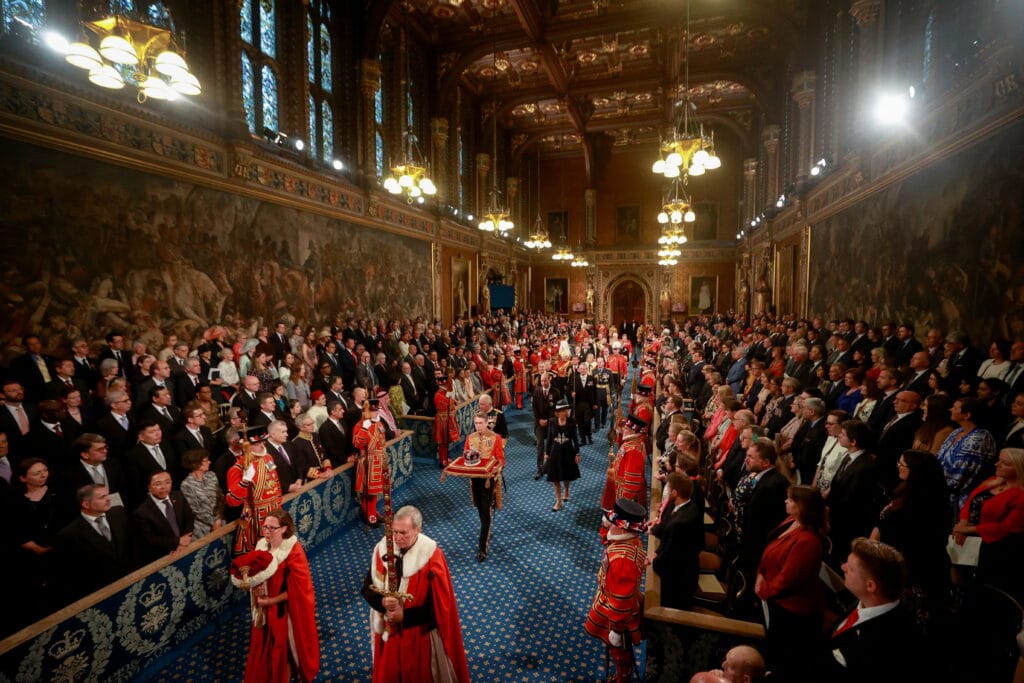Tories confirm conversion therapy ban won’t cover trans people or ‘consenting’ adults

Prince Charles, Prince of Wales reads the Queen’s speech next to her Imperial State Crown in the House of Lords Chamber. (Alastair Grant – WPA Pool/Getty Images)
Britain’s conversion therapy ban will imminently be brought forward in parliament this year – and it will exclude both trans people and “consenting” adults.
On Tuesday (10 May), Prince Charles, Queen Elizabeth II’s son and heir, promised the long-sought ban during his speech at the State Opening of Parliament.
“Legislation will be introduced to ban conversion therapy,” he briefly said from the House of Lords chamber.
There was a sense of déjà-vu as Charles echoed his mother’s words made last year during the Queen’s Speech when she first confirmed the ban, later riddled by delays and furious criticism.
But the government confirmed in the speech’s guidance notes, seen by ITV News, that the Conversion Therapy (Prohibition) Bill will both exclude trans people and so-called “consenting” adults.
Considering that the move was done in the face of fierce protest from LGBTQ+ advocacy groups and top medical institutions, news that the ban will still abandon trans people was dubbed “immoral” by one conversion therapy campaigner.
The law will only “ban conversion therapy practices intended to change sexual orientation”, the brief states. Yet, what the ban actually outlaws will be even more limited, the brief confirmed.
The government said the measure “will protect under-18s, regardless of circumstance, and over-18s who do not consent and who are coerced or forced to undergo conversion therapy practice”.
This all but confirmed fears raised by activists last year of a glaring loophole that will still allow the dangerous, discredited practice compared to torture by human rights groups to torture.

Prince Charles, Prince of Wales, at the State Opening of Parliament in the House of Lords. (Hannah McKay – WPA Pool/Getty Images)
“By creating a loophole of consent, the government continues to ignore the advice of legal experts and survivors like myself, who know that this will continue to put many lives at risk,” Jayne Ozanne, a former LGBTQ+ government advisor, told PinkNews.
“It is utterly immoral they have omitted trans people from a ban and created so many loopholes, that risk making this is a ban in name only.”
The government has previously said that its definition of consent will be “robust and stringent” – but it will still allow adults to “volunteer” themselves for talking conversion therapy.
It remains unclear, however, whether a second loophole that seemingly allows faith-based forms of the practice to remain legal will remain in the ban.
Faith-based conversion therapy – anything from “praying the gay away” through to troubling exorcisms – is the most common form of the practice. Fifty-one per cent of people who have endured conversion therapy had it conducted by faith groups, according to the government’s 2018 National LGBT Survey.
Prime minister Boris Johnson said in April that his government will prohibit “abhorrent” gay conversion therapy, a statement he made after partially U-turning on leaked plans to drop the ban altogether.
But as much as the ban was revived by the government, it was dramatically scaled down by excluding trans people – something Johnson said was too “complex” to legislate.
“A ban on conversion practices that doesn’t cover both sexual orientation and gender identity protects nobody. Those who want to erase or suppress LGBTQ+ people from living their lives do not differentiate between the two,” a Stonewall spokesperson said.
“Globally, all recent bans have covered both because the international community recognize that the motivations behind the practice stem from one thing: a hatred of LGBTQ+ people.
“The UK Government must stop playing politics with our lives and introduce a ban that protects all LGBTQ+ people.”
According to the government’s own research, trans people are nearly twice as likely to have undergone or be offered conversion therapy than their cisgender counterparts.
“The government’s duty is to protect the most vulnerable from abuse,” Ozanne said, “not to side with the abusers.”

